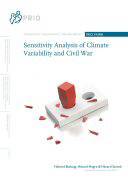Burke et al. (2009) report that warming is robustly linked to civil war in Sub-Saharan Africa (SSA). Their analysis builds on an earlier article by some of the same authors that found negative rainfall deviation to increase civil war risk through its adverse impact on economic growth (Miguel, Satyanath & Sergenti, 2004). Although the most recent article departs from the original’s instrumental variable approach and its non-result for rainfall undermines the earlier conclusion, both studies deserve credit for addressing an under-researched area and for innovative use of meteorological data in conflict research. Moreover, their conclusion seems to corroborate widespread notions about a powerful connection between environmental degradation and armed conflict.
A crucial question remains, however; is the reported link between temperature and civil war robust? A recent study by Buhaug (2010) addresses this question by conducting two complementary tests: adjusting the model specification and using alternative measures of climate variability and civil war. The claimed finding passed neither of these tests. This paper documents a wider set of sensitivity tests that provide further proof of the empirical disconnect between climate variability and civil war outbreak, incidence, and severity










